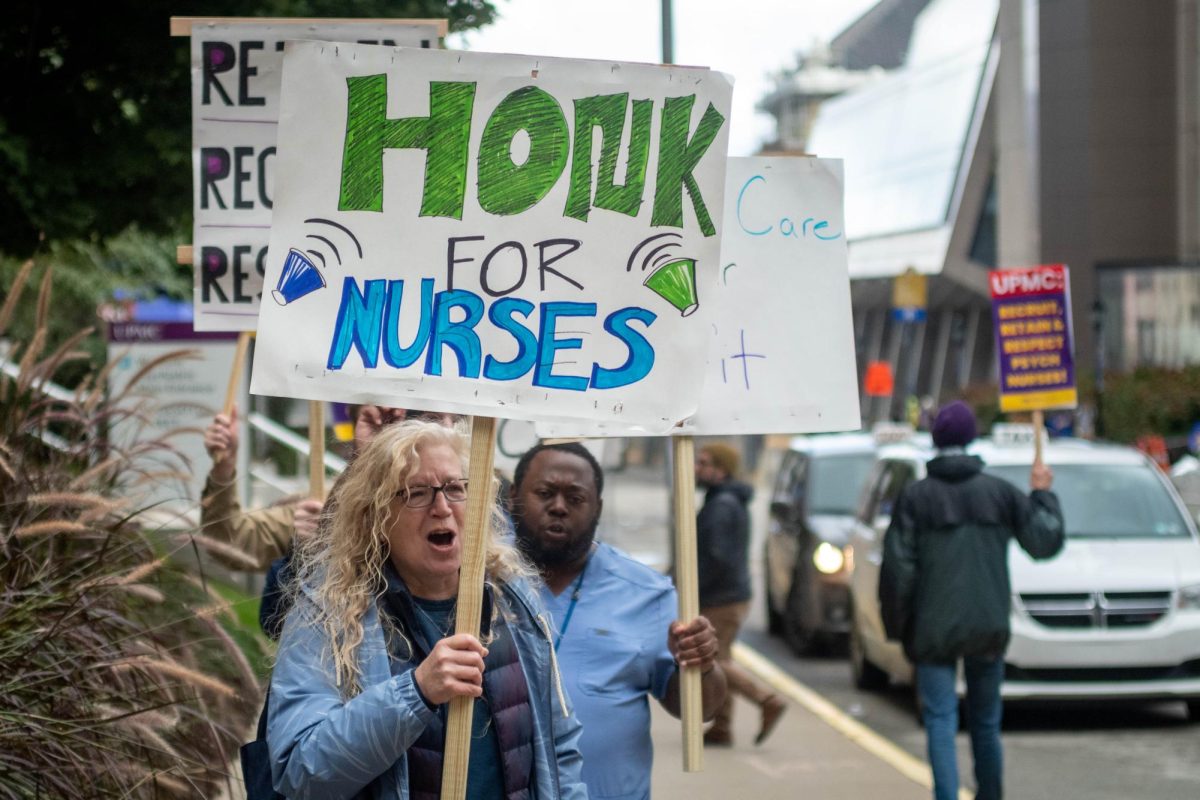Nurses at UPMC Western Psychiatric Hospital, along with elected officials and mental health advocates, gathered outside the hospital on O’Hara Street Wednesday afternoon to rally for improved staffing and wages as union contract negotiations with UPMC continue.
The protest was organized by SEIU Healthcare Pennsylvania after a unanimous strike authorization vote by Western Psych nurses last week. The union, which represents about 115 staff nurses at the facility, has been negotiating a new contract with UPMC since Aug. 1.
Christopher Hunter, a nurse at Western Psych for eight years and president of the local SEIU chapter, addressed the crowd, highlighting the understaffing issues affecting the hospital.
“UPMC has completely shut down the units for kids and adolescents because they have understaffed our floor, and we are down to only 11 beds,” Hunter said. “We can’t admit a lot of the patients seeking care, so they have to wait months for backlogged outpatient appointments.”
Hunter pointed out the turnover rate among nurses, stating that 123 nurses have left the hospital in the last three years — a more than 100% turnover rate, according to him.
Marah McDonald, a 27-year-old registered nurse at Western Psych, described the challenges of providing adequate care under current conditions.
“Here I have about 15 patients, normally,” McDonald said. “I rarely have time to do much more than provide the medications that my patients have ordered and do all of the charting that’s required for 15 patients.”
McDonald, who previously worked at a children’s psychiatric hospital in Ohio, contrasted her experiences.
“At my last job, I had about six patients,” McDonald said. “I was more able to provide comfort and empathy, and also help my patients when they were in crisis. I was able to spend more time with them, talking them down, which also prevented a lot more crises.”
According to McDonald, UPMC’s current staffing ratios fall “below market rate” and play a part in the shortage.
“The pay. It’s not attracting new nurses, it’s not keeping old nurses,” McDonald said. “We’re unable to keep up, even at the staffing that they allow us to have.”
John Hobdy, a 36-year-old psychiatric nurse who has been with Western Psych for over two years, shared his experiences working night shifts.
“My floor, we’re responsible for responding to all conditions in a hospital,” Hobdy said. “So when a condition goes off, one [overnight] nurse is left responsible for 22 to 27 patients.”
Hobdy expressed frustration with UPMC’s approach to negotiations.
“I’ve been at every negotiation meeting with UPMC since we started Aug. 1, and each time they showed us nothing but disrespect,” Hobdy said. “They have not taken this seriously. They come unprepared. They make us wait hours for a response, and they totally rejected our staffing proposal with no counter.”
The staffing proposal entailed guarantee that there “would be more than one nurse on a unit at all times,” Hobdy said. The nurses’ other demands include higher starting wages to attract new nurses and compensation that will retain experienced employees.
“UPMC simply is not investing in mental health the way they need to at a time when mental health in the country is in a crisis,” Hunter said.
Several elected officials attended the rally to show support for the nurses. State Representative Jessica Benham, a member of both the Autism & Intellectual Disabilities Caucus and Mental Health Caucus, emphasized the connection between working conditions and patient care.
“We need to make sure that you have what you need in the workplace in order for your patients to have the best outcomes,” Benham said to the crowd.
Allegheny County executive Sara Innamorato also addressed the crowd, highlighting the broader community impact of the staffing shortages at Western Psychiatric.
“When folks like UPMC don’t step up and care for their workforce and we have [a third of these] beds that are going unfilled,” Innamorato said, “and we are starving a desperately needed system of valuable resources … the burden falls on all of us.”
In a public letter, Hunter argued that UPMC, with its reported $27 billion in revenue and $8 billion in cash and investments, has more than enough resources to invest in Western Psych and its staff. As contract negotiations continue, the nurses remain hopeful that a strike can be avoided, despite their unanimous strike authorization vote.
“As nurses, we never want to strike,” Hunter said. “We hope that this picket [protest] is as far as we have to go. But we have voted unanimously to authorize a strike because we have to stand up for our patients. And UPMC is leaving us with no other choice.”
The union has set up a website for community members to show their support. They are also encouraging people to use the hashtag #SupportWesternPsychNurses on social media to raise awareness about their cause.
McDonald highlighted the importance of nurses’ work in UPMC Western Psych.
“Our adolescent patients here at Western Psych are at a very vulnerable time in their lives,” McDonald said. “They often do not have adults in their lives to nurture and care for them. We nurses are left to fill that role.”
The protest called for UPMC to prioritize its workers over non-pressing financial expenses.
“When I’m unable to provide that empathetic support, and then see that UPMC has leased a $50 million luxury jet, it makes me sad,” McDonald said. “It shows where UPMC’s priorities are … nurses are not their concern, patients are not their concern. We are here today to make it their concern.”


